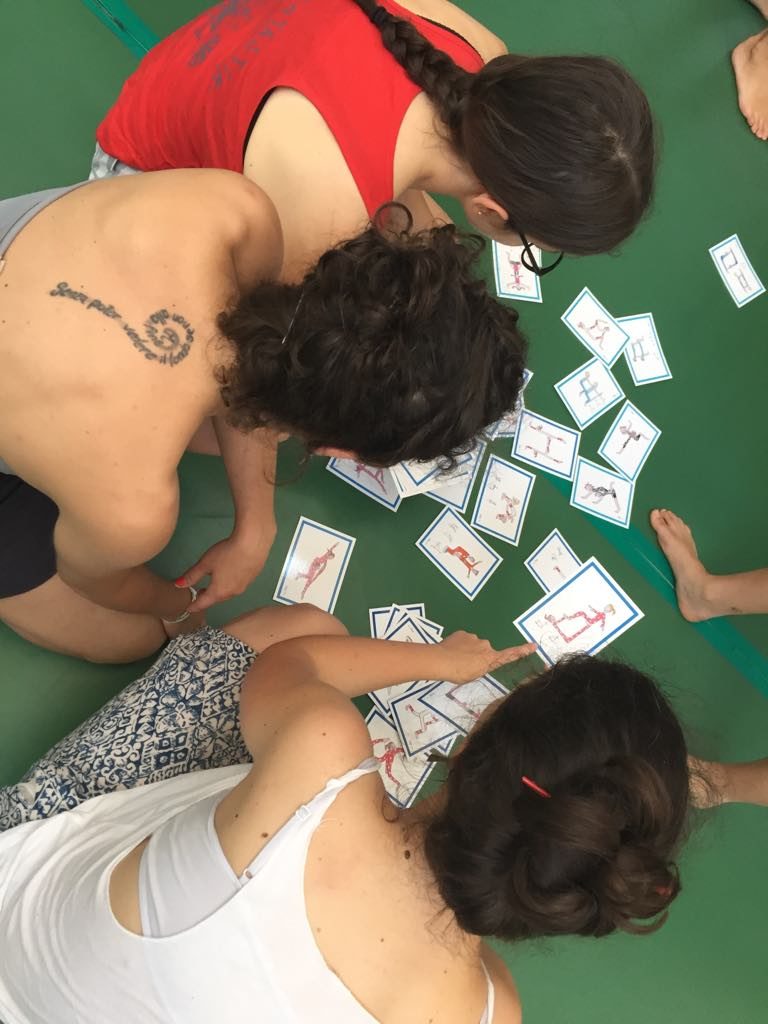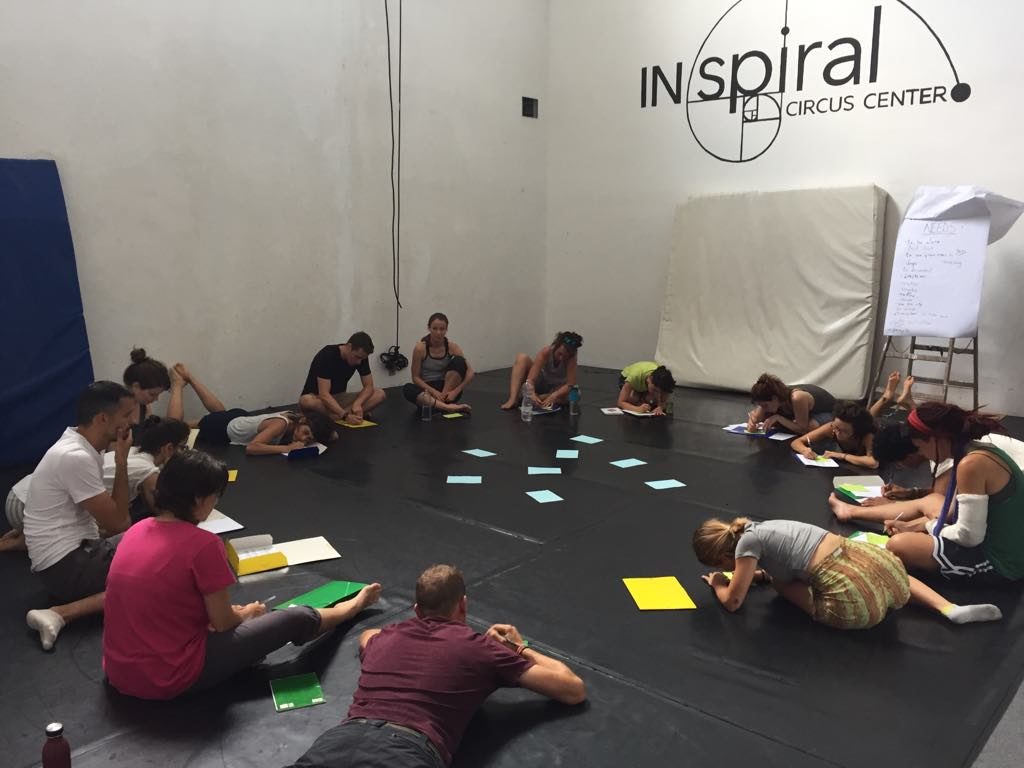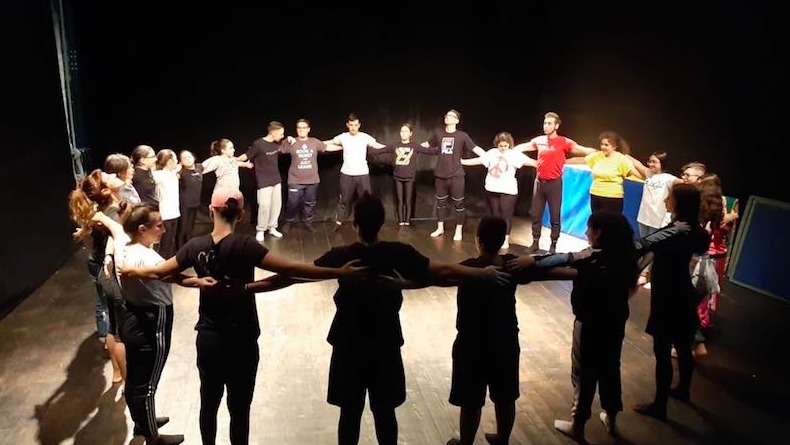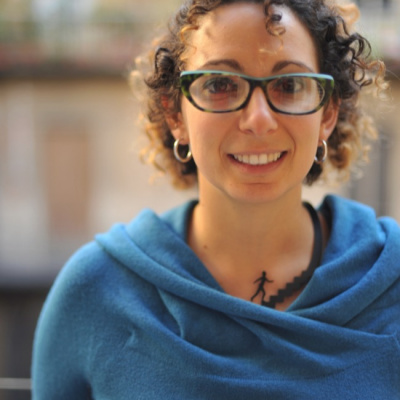Opening the Circus Tent– Social Circus Training for Educators for the Inclusion of Minority Groups
Opening the Circus Tent – Social Circus for the Inclusion of Minority Groups is an intensive training program for circus artists, teachers, educators, animators or social operators who wish to use social circus as a tool for the inclusion of minority groups.

I talked to Rafael Jack Sánchez Mc Guirk from Circo Corsaro at Inspiral, the training space in Budapest that is hosting the project. Circo Corsaro is in a strategic partnership with the Erasmus + programme for the cooperation and for innovation and exchange of good practices.
Irene Pepe: Can you briefly introduce yourself and your organization?
Sánchez Mc Guirk: I am a social educator, and a circus pedagogue, originally from Spain. I have been working in Italy for Circo Corsaro for six years now.Thanks to this experience, I was trained by the Cirque du Monde program (whose pedagogical approach is based on a combination of circus arts and social intervention) created by Cirque de Soleil.
I also studied at Formazione Italiana Circo Sociale (FICS), one of the first university courses on social circus in Europe. It is part of an important network and it is focused on pedagogy.Here in Budapest I am one of the three trainers for the European project.

Circo Corsaro is a Social Circus project directed by Maria Teresa Cesaroni, who since 2004 has been working in the territory of Scampia (a northern suburbs of Naples) and other difficult suburbs of Naples, dealing with integration, at risk children and youth at risk of dropping out of school.We are the project leaders of the Opening the Circus Tent project.
IP: What are your activities as a social circus project? Who are your partner organisations in Naples?
SM: Circo Corsaro is a project together with the Fondazione Patrizio Paolettithat involves youth from around Naples. We have 2 projects together in a difficult area of the city.
One of them is in a secondary school where there are many problems related to drop outs.We do circus lessons in the mornings. We try to create a safe learning space where students can find wellness in the school. We also help them to learn while doing circus with us.
We also have a circus project in a theater (TAN Teatro Area Nord) for three days a week, with 35 people of different age groups. They learn how to develop artistic expression and develop relationships.

In this area there are also two other organizations. Two of them with which we collaborate are Centro Mammut and GRIDAS. They have been working to contrast the criminality and lack of education of the youth.
One of the most special moments and events by GRIDAS (Gruppo Risveglio Dal Sonno) is the Carnival. Below is a video of the Carnival 2019 organized by GRIDAS made by Municipality of Naples.
For the kids is really important to participate in the Carnival. It is a traditional event for the neighborhood– it has been going on for over 37 years. Since it is important to understand our context, we invited our Erasmus+ partner to attend last year’s Carnival.
Another association that works in the territory is Chiku Gastronomia, an Italian-Roma restaurant where the Napolitan kitchen meets the Roma one and they find a common dimension.
IP: Let’s talk about the Opening the Tent project. What is the main goal of the project?

SM:The main aim of the project isto improve the impact of our actions in our everyday projects. To do so we believe is the key to get to know different pedagogical approaches used in non-formal education so we can learn their different best practices by sharing them between us, the Opening the Tent partners.
IP: Who are the other two partner organizations and why did you team up together and apply for an Erasmus plus?
SM: The other two partner organizations aretheHungarian Juggling Association and the Spanish organization,The Donyet Ardit Circus Association. We met in Menorca at an international seminar about social circus in 2015,and two years later, at theVEncuentro de circo social ACIRKAOS 2017.We decided to apply for an Erasmus plus together.
Our need was to go abroad and to share what Circo Corsaro does in Naples for humanity and see what other social circus projects do. I think that this is also the main objective of the project, to understand how we do social circus in our different realities.
Even among the minority group we work the most with, which is the Roma Community (but we work in mixed groups with youngsters of diverse backgrounds), each of the participating associations in this project has a different local context and a different method of intervention with youngsters.
IP: What are the different education methods of the project organisations?
SM:Donyet Ardit is working with youngsters of Roma and migrant backgrounds in the periphery of Alicante, Spain in a poor neighborhood. They give inclusive workshops focusing on circus and gender identity, analyzing how gender and the inequalities that derive from it cross our lives and often decide for us involuntarily.
The pedagogy followed by the Hungarian Juggling Association is inspired by the Pedagogy of the Oppressed also called critical pedagogy or pedagogy of liberation from Paolo Freire. The main goal of critical pedagogy is to establish a learning process that fosters critical consciousness which leads to an emancipation from oppression. Then individuals and groups with critical consciousness will effect change in their world.
The Hungarian Juggling Association works mainly in the district of Pesterzsébet which is very affected by discrimination and marginalization.
The pedagogy that Circo Corsaro uses for their work is the Pedagogy of Third Millennium(PTM) applied to social circus, participation tools for youth and social circus shows.
IP: Why a training for educators?
SM: Because the first objects of study of education are the educators themselves.
The educational model of PTM is “educate to educate,” so the first object of study for all those who wish to activate an effective educational process is itself.
As educators, we should be “neutral.” As educators, we should be aware of our own bias and we should know how to pursue our goal of fostering the social inclusion of disadvantaged youngsters and constrain the difficulties of reality without imposing our visions.
IP: How many trainers and educators have joined the projects?
SM: We are three trainers, one from each partner organization, and with an overall group of 17 educators; six from Spain, six from Italy and five from Hungary.
IP: How was the training in Budapest?
SM: We organised three workshops specifically for educators, animators or social operators in our three realities where we could meet to develop our activities together in the way we usually do, explaining the pedagogical tools we use.
We tried to mix the three different perspectives together so that we can learn from each other and I believe we have learned a lot from those.
Something that surprised me was that the seminar participants were educators without a strong circus background. They all teach and lead groups, but not with a specific previous circus experience. And on a funny side note, we were also happily surprised by the really hot weather in Budapest!
IP: What is the next step?
SM: We want to continue the projects. We expect that the learning achievements of the participants will materialize in the quality of future interventions, and the network created amongst the professionals will continue supporting the work of all of us. Our goal is to create a methodology to transmit our best practises and since we had great feedback, we want to reproduce these trainings, and to hopefully include more countries.
All photos provided courtesy of The Opening the Tent project....
Do you have a story to share? Submit your news story, article or press release.




